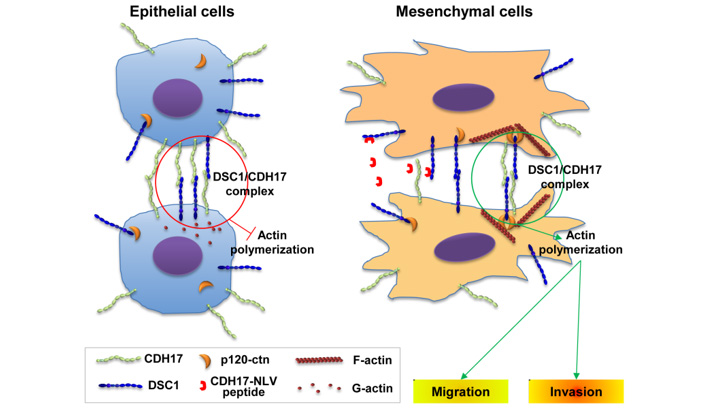
A study published in the Journal of Experimental & Clinical Cancer Research by Dr. Ignacio Casal's group at the Margarita Salas Center for Biological Research (CSIC) has unveiled a new molecular mechanism of control of the invasion and metastasis process in colorectal cancer that could represent a potential new therapeutic target.
The extreme complexity of the process of metastatic dissemination in colorectal cancer means that the molecular and cellular underlying mechanisms of this process are not yet fully understood. Bartolomé et al. demonstrate that desmosomal cadherin Desmocollin 1 (DSC1) forms associations with CDH17, a crucial factor in promoting metastasis in colorectal cancer to regulate migration and invasion specifically in mesenchymal or poorly differentiated colorectal cancer tumors.
Proteomic and confocal analyses and in vivo animal models have demonstrated mechanistic evidence supporting the involvement of p120-catenin, likely recruited through the cytoplasmic domain of DSC1, in the DSC1/CDH17 complex. Remarkably, immunohistochemistry analysis of colorectal cancer biopsies showed high expression of DSC1 at the invasive front, hinting at its role in the emergence of budding cells and potential formation of circulating tumor cells (CTCs).
Additionally, silencing DSC1 in metastatic mesenchymal cells enhanced mice survival by impeding liver homing and metastasis.
Furthermore, the authors probe that the NLV sequence in CDH17 is a potential binding motif for the CDH17-DSC1 interaction. A synthetic NLV peptide successfully blocked the CDH17/DSC1 binding, inhibiting cancer cell migration, invasion, and metastatic homing.
The study now published shows that disrupting the CDH17/DSC1 interaction could offer a novel approach for targeting metastatic dissemination in colorectal cancer. In summary, these findings illuminate the multifaceted roles of CDH17, DSC1, and p120-catenin in colorectal cancer metastasis, opening new avenues for therapeutic intervention.
Reference: A complex of cadherin 17 with desmocollin 1 and p120-catenin regulates colorectal cancer migration and invasion according to the cell phenotype. Rubén A. Bartolomé, Laura Pintado-Berninches, Ángela Martín-Regalado, Javier Robles, Tania Calvo-López, Marina Ortega-Zapero, Celia Llorente-Sáez, Issam Boukich, María Jesús Fernández-Aceñero & J. Ignacio Casal (2024) J Exp Clin Cancer Res 43, 31. https://doi.org/10.1186/s13046-024-02956-
More information:
CSIC Press Release (in Spanish): link.

